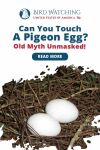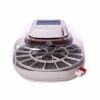
What’s This Post about?
Ubiquitously found in all the major towns and cities worldwide, pigeons are one of the most prevalent birds.
Highly gregarious in nature, they choose to stay in a flock, building their nests in concealed spots, away from the sight of predators and humans, to keep their eggs and young ones protected.
However, ornithologists need to closely study the pigeons and their eggs to explore the fascinating facts about the brilliant birds. This cannot happen unless they observe the egg correctly with their hands.
Not only this, but the inquisitiveness of humans sometimes causes them to caress the egg if they come across a pigeon nest – which in itself is a rare sight. Does this mean the pigeons would reject their eggs, knocking them away or completely deserting their nesting site?
Pigeons do not mind humans touching their eggs and wouldn’t reject them if you keep them back in the same place. However, too much disturbance or threats of external species scares them. If they realize that they have been exposed to predators, they might desert away, abandoning their nests and eggs.

Can You Touch a Pigeon Egg?
For the longest times, we’ve been told that touching the eggs of a pigeon would cause the pigeon to abandon the eggs.
Ornithologists, however, have claimed this to be a false hypothesis. Touching the egg or a newly hatched baby of a pigeon and moving it around within the confinements of the nest wouldn’t make much difference to the pigeon.
The pigeon would still own up to its eggs and continue to incubate them. So the fact that you’ve touched the egg wouldn’t deter the pigeon from raising it.

The conception that pigeons would reject their eggs or offspring due to the human scent appearing from the eggs is much of a folklore.
However, conducting considerable research, ornithologists have refuted this concept, denying the prevalent belief that birds will reject their eggs or young if you lay a finger upon them.
Many avid birders and researchers routinely handle the unhatched eggs of the pigeons to study them. It is an essential practice to assess the fertility of the eggs.
No matter how capricious the pigeons appear, a human touch is not a sufficient reason to abandon their eggs or young. It is essentially denying the fundamentals of biology and the innate desire for the bird to nurture its offspring.

What Happens If You Move Pigeon Eggs?
Pigeons do not abandon their eggs and young in the nest due to human touches - but they will abandon them in response to a disturbance around their nest.
To enable the pigeons to raise their young freely, it’s best not to fiddle around their nests and cause interference in raising their babies. Such rumpus might scare the parents away, and they might desert away.
With high parental instincts, mother pigeons are pretty tenacious and wouldn’t simply reject their eggs if you touch them.

However, what might happen is that when they return to their nests, they might observe a disruption in the state of their dwelling. Then, intelligent enough to judge the interference of an external intruder in their nest, they might leave it only temporarily or altogether to find a new place of shelter.
If you relocate the nest of the pigeons and move it even slightly from its original place, the pigeons may or may not accept it. This is because pigeons are location-specific and have a precise spot in mind to find their eggs.
Even if the internal nest setting is intact, their nest in the new site might seem foreign to them, and the mother would refuse to identify the eggs as hers, absolutely ignoring the eggs. Many a time, pigeons reject the nest entirely, leaving their eggs behind as well.

Warning
Do not wander around or interfere with the nesting sites of pigeons unnecessarily; otherwise, they may desert, leaving their eggs desolated.
Can Pigeons Recognize Human Scent?
Where does the old myth that a pigeon would reject its young if humans touch it stem from? It derives from the popular belief that mother pigeons have the potential to recognize human smell on their eggs when humans touch them.
That’s not true!
Pigeons are undoubtedly a brilliant species of birds having numerous distinct characteristics, but their smelling capacities are limited.

Even if the mother pigeon is able to smell human scent on its eggs, it wouldn’t simply end up abandoning the eggs just because you have touched them.
Warning
If you're attempting to handle pigeon eggs, make sure to wear gloves. The scent of your hands is what might make them foreign to the parents, so try not to alter the scent of the eggs by handling them with bare hands.
Pigeons, however, do not have a well-developed sense of smell and, if handled with proper caution, aren’t able to detect that their eggs were carried away for a few minutes. Therefore, as long as these eggs are returned to the nests in an intact state, the pigeons are determined to incubate them.

Why Do Pigeons Abandon Their Eggs?
Simply touching or feeling the egg of a pigeon without damaging it wouldn’t cause the pigeon to let go of its unborn chick.
After all, pigeons are one of the most dedicated species who take their parenting responsibilities very seriously, from the moment they lay the eggs till their squabs are independent enough to fly around on their own.

Fun Fact
The young of pigeons fledge for the longest time in their nests – almost six weeks.
Let’s explore the possible reasons that pigeons might abandon their eggs.
Unhatched Eggs After Incubation Period Is Over
Pigeons incubate their eggs for around 18 to 19 days. If the eggs don’t hatch after a wait of 22 to 24 days, the female pigeon is able to sense that her eggs are infertile and wouldn’t be hatching. She, therefore, leaves these eggs unhatched.
Relocating the Nest
Pigeons are very finicky about the location of their nests. Even before they start building their nests, they choose their nesting site very heedfully. Displacing its nest, especially when the eggs are inside, is very bothersome for the pigeons.

Often, they do not approve of this change and might leave the nesting site searching for a new home. Even the unhatched eggs are left behind as the pigeons might not find the relocated site pleasant to dwell on.
External Intrusions
Both the male and female parents are incredibly vigilant and cautious during the incubation period, constantly safeguarding their territory. During this time, if they get scared of any external intrusions or even too much interference of humans around, they may be disturbed.
Although pigeons are fond of having humans near them, they do not appreciate too much involvement from their side, especially towards their offspring. This disturbance causes them to leave their nests and find another site.
Exposure to Predators
Observing a cat, hawk, falcon, or the presence of any other predator can scare the pigeons away. Suspecting the presence of such threats near them, the pigeons realize that they, along with their eggs, are endangered, causing them to flee away, abandoning their eggs back in the nest.

Death of a Mate
Pigeons are monogamous species, usually mating for life. In such instances, if one in the pair dies, the other might not be willing to raise the babies on its own. Hence, it might give up incubating its unhatched eggs.
But this is not always the case. So many times, the single pigeon has proved itself so devoted, incubating the eggs single-handedly and raising its hatchlings on its own.
Sick Parent Pigeon

If the pigeon gets sick after laying eggs in the nest, its health might debilitate, and it might not be able to incubate the eggs efficiently.
Incubation is not easy - the pigeon needs a lot of energy and patience to incubate the eggs for the entire period. In such cases, it might end up ceasing its incubation.
Can Pigeons Carry Their Eggs?
Typically flapping their wings rapidly to move around, the only way pigeons can hold on to something during flight is with their beaks.
Unfortunately, pigeons cannot carry their eggs along with them. Their beaks are not designed to pick up an elliptical-shaped egg, so if they decide to relocate after they’ve laid their eggs, they would have to abandon them in the old nesting site.

Did You Know?
Only if the eggs are situated on the ground can the pigeon move the eggs around with their beaks. Pigeons, however, choose elevated surfaces for their nesting, so this is quite unlikely.
Even if the pigeon needs to move the eggs within the nest, it will use its beak to do so. If you’ve ever witnessed the hatching of an egg, you would have noticed how cautiously the pigeon removes the cracked eggshells from the hatchlings, helping them out of the eggs.
Unless the babies hatch out of the egg and fledge enough to fly, the parent pigeons stay committed to their nesting site.

If the pigeons sense threat after the nestlings have hatched out of the eggs, the bird might relocate the young to a new nesting site if possible rather than altogether abandoning their offspring, knowing that a potential predator has discovered their presence.
What To Do If You Find A Pigeon Egg?
In rare instances, you might stumble on an egg lying on the ground, in the loft, or walkways near the nesting sites of pigeons.
This could be due to several reasons. Perhaps, there was a turmoil in the nest, with some scuffling among the pigeons, causing one of the eggs to knockdown.

There is also a possibility that a predator might have gotten its claws on the nest of the pigeons and fiercely captured an egg. Or maybe, the parent pigeon itself wanted to get rid of the egg, hence pushing it out of its nest.
If you find a pigeon egg, return it back to the nest. If you do not know the exact location of the parent’s nest, look around for an empty nest nearby, or one having similar eggs and put it back in the nest.
We can only hope for the parent bird to accept the egg and incubate it. However, this is quite unlikely since the parent bird might identify it as foreign. Furthermore, even if it is incubated, there is very little chance of survival as the egg may be cracked when knocked, causing damage to the embryo inside.

How Can You Tell If the Chick Inside The Egg Is Alive?
Pigeon eggs take almost 18 - 19 days to hatch. After nearly five days of incubation, you can determine if the egg is fertile or not. To check this, scientists and birders have to pick the eggs from the nest. This does not mean that the pigeons would reject their eggs.
It is essential to establish if the egg contains an alive chick or it has succumbed so that the pigeons can meticulously persist with their incubation. If the egg wouldn’t hatch to produce a nestling, it is best to let go of the egg. This signals to the pigeons to prepare to breed the next clutch.

If you’re wondering whether pigeons would grieve the loss of their missing egg or not, read this blog to find out more.
Do Pigeons Have Feelings? Do They Get Sad, Cry, Or Love?
The idea of pigeons having human-like feelings sounds crazy, but what if pigeons can actually sense emotions like us? Keep reading to find out.
Here are a few ways you can explore to check if the egg would hatch or not.
Lightly Tap the Egg
Slightly tap the egg on the surface and listen very closely for any sound from the inside. If the egg is in the later stages, close to hatching, the chick would have significantly developed inside, so you’re likely to hear some movement.
Candling or Torch Light
This is a more accurate technique to assess if the egg is forming a chick inside or if the egg is even fertilized.
To do this, place the egg on a flat surface, pointing the flashlight towards it. If you’re using a candle, place the egg in the dark with a lit candle.
As this bright light shines on the egg, you can get a faint glimpse of the inside of the egg. The egg turns bright orange, but these subtle signs can help you identify if there is a chick in the egg or not.
| Color | Appearance | Fertility Status | |
|---|---|---|---|
| Bright yellow-orange | Overall yellow color – signaling the presence of yolk | Infertile egg | |
| Orangish with red streaks | Veins running through the egg with a dark patch in the middle | Fertilized egg with a chick developing inside | |
| Bright yellow with clear space | Clear space at the base of the egg and a blotchy shadow of the chick | Chick has died inside the egg |
How To Take Care of An Abandoned Pigeon Egg?

If you notice a fallen pigeon egg or one that has been lying in the nest for a few days without the parent pigeons tending to it, step ahead to take care of the abandoned pigeon egg.
However, keep in mind that if you’re taking the responsibility to tend to the egg, it won’t be an easy task, and you would have to take note of the peculiarities to ensure a healthy chick hatches out of the egg.
To look after the egg, start by checking for its fertility. If the chick is developing inside, proceed forward by artificially incubating it since eggs need an optimal temperature to thrive.
Make sure you keep the egg in a safe and warm place, away from any external disturbances for the chick to be born healthy.
You could choose an enclosed cardboard box, placing a heat lamp inside to keep the temperature right. The optimum temperature is 37° C, so make sure you keep checking the temperature frequently. However, the best option would be to explore an egg incubator such as Harris Farms Nurture Right Incubator
Harris Farms Nurture Right Incubator
Clear top on incubator makes it great for educational observation.
Set the incubator’s temperature at a minimum of 37.2 and maximum of 37.5 Celsius, and humidity level ranging between 55-60%.
Keep monitoring the egg frequently, noting the number of days in incubation. The egg will hatch after completing 18 or more days of incubation.
During this time, make arrangements to look after the chick once it hatches. Baby pigeons are extremely dependent on their parents, relying on them entirely until they’re almost six weeks old.
Be prepared to tend to the tiny squab until it is old enough to fly around on its own.
Get some supplies to feed the young, as they cannot be fed the regular pigeon feed. The parent pigeons wouldn’t be there to feed the crop milk, so make sure you find an alternative. Using a baby syringe to feed the hatchling for the first few days is recommended.
Keep Reading!
The view that pigeons would reject their eggs if you touch them is now regarded as an old folklore. However, pigeons do not mind you taking a gentle sensation of their eggs even though they might get aggressive and begin pecking on your heads.
These gentle, tender-hearted species would put in all their efforts to diligently raise their offspring. They can’t dismiss their eggs simply because you have laid a finger on them.
However, often, you might come across abandoned pigeon eggs due to a number of reasons. If you come across an abandoned egg, check its fertility. If it turns out to be fertile, try keeping the egg under your protection.
To know more about pigeon eggs, read this interesting post to find out how long do pigeon eggs take to hatch.
How Long Do Pigeons Eggs Take to Hatch? & More Pigeon FAQs
Wondering how long the pigeon eggs in your balcony would take to hatch? Then, explore the fascinating cycle of pigeon eggs right after they're laid!

By David A. Swanson
Bird Watching USA
My name is David and I'm the the founder of Bird Watching USA! I started Bird Watching with My father-in-law many years ago, and I've become an addict to watching these beautiful creatures. I've learnt so much over about bird watching over the years that I want to share with the world everything I know about them!

David A. Swanson
Bird Watching USA
My name is David and I'm the the founder of Bird Watching USA! I started Bird Watching with My father-in-law many years ago, and I've become an addict to watching these beautiful creatures. I've learnt so much over about bird watching over the years that I want to share with the world everything I know about them!





